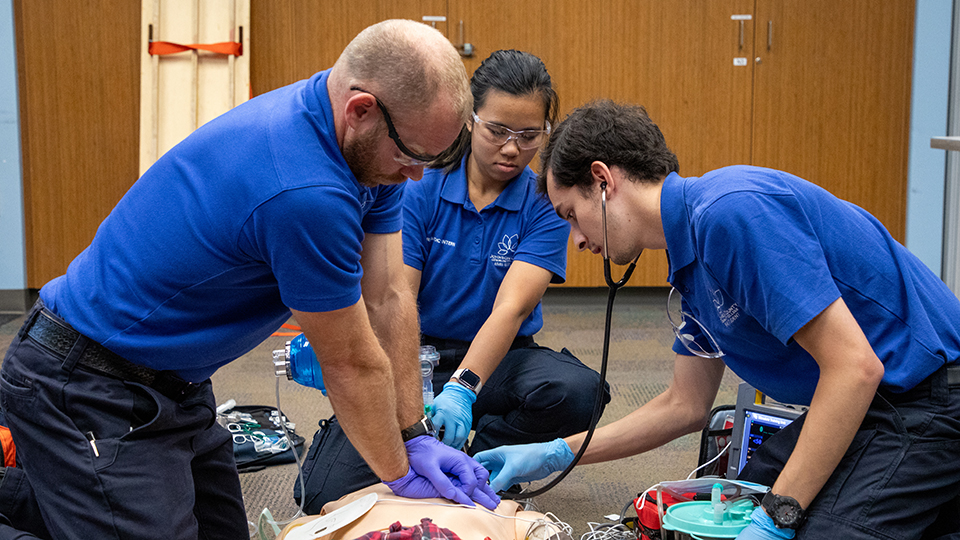A competitive healthcare certificate with applications accepted between February and April. Classes start in July and end in December of the following year.

JCCC paramedic graduates score well above national and state averages
Paramedics are emergency healthcare leaders who assess and manage a patient’s needs and are sought after in many areas of healthcare.
Once you have successfully completed the EMT program and 17 hours of general education requirements, you can apply for the paramedic program. Graduates of the paramedic program also earn their Emergency Medical Science, AAS.
The paramedic certificate program consists of lecture, lab, simulation, hospital clinicals, and a field internship. You will learn the latest evidence-based pre-hospital medical care, including:
- Advanced cardiac life support
- Vascular access and medication administration
- Advanced airway techniques (intubation, cricothyrotomy, and needle decompression)
- Interpersonal and therapeutic communication skills
After earning your certificate and passing the required license exams, you can provide advanced pre-hospital care as a paramedic.
Paramedic training is divided into 10 courses
EMS 221, 226, and 231 are 3-credit-hour courses that include observational ride-along shifts with local EMS agencies and teach:
- Anatomy and physiology of the human body
- Patient assessments and medical terminology
- Competency in pharmacology and drug dosing
- Advanced patient care skills
EMS 235, 240, and 245 are 3-credit-hour courses that dive into the depths of pre-hospital emergency medicine.
- Incorporate the latest research-based information on medical emergencies and trauma into your care plans.
- Manage critical cardiac, medical and trauma scenarios in lab
- Additional ride along shifts while providing BLS care for patients with local EMS agencies
- Complete Advanced Cardiac Life Support (ACLS) and Pediatric Advanced Life Support (PALS) courses
EMS 250 and 255 are 6-credit-hour courses to obtain your ALS certifications.
- Intern at local hospitals, practicing ALS skills and patient care under the supervision of hospital staff.
- Continue riding with local EMS agencies, now implementing advanced care skills and knowledge into their patient care and reports.
- Attend lectures from local experts working in various fields to enhance previous learning objectives.
- Improve team dynamics, advanced skills, treatment plans and patient care during simulation days.
EMS 260 and 272 are 8-credit-hour courses that prepare you to obtain the ALS licensure at a state and national level.
- Lead critical medical and trauma scenes under the direct supervision of paramedic preceptors.
- Improve communication skills writing comprehensive patient care and radio reports.
- Use learned professional and interpersonal skills to interact with emergency healthcare personnel in fire departments, ambulance services, and hospitals.
- Master patient care through patient assessment, differential diagnosis, skills, and treatments.
Students earn their Associate of Applied Science degree upon completion of the Paramedic Certificate program.
[Catalog] Associate of Applied Science (AAS)
Note: KAR 109-11-8 (5) (B) requires confirmation of eligibility for at least an Associate of Applied Science (AAS) degree before students attempt the Paramedic licensure exam.
Contact Info
Email EMSinfo@jccc.edu for general inquiries about the EMS program,
Debbie Herrig, Administrative Assistant, EMS Program
Phone: 913-469-3419
Location: SCI 110A
Email: dherrig1@jccc.edu
Charles Foat, Director EMS
Phone: 913-469-3437
Location: SCI 110E
Email: cfoat@jccc.edu


